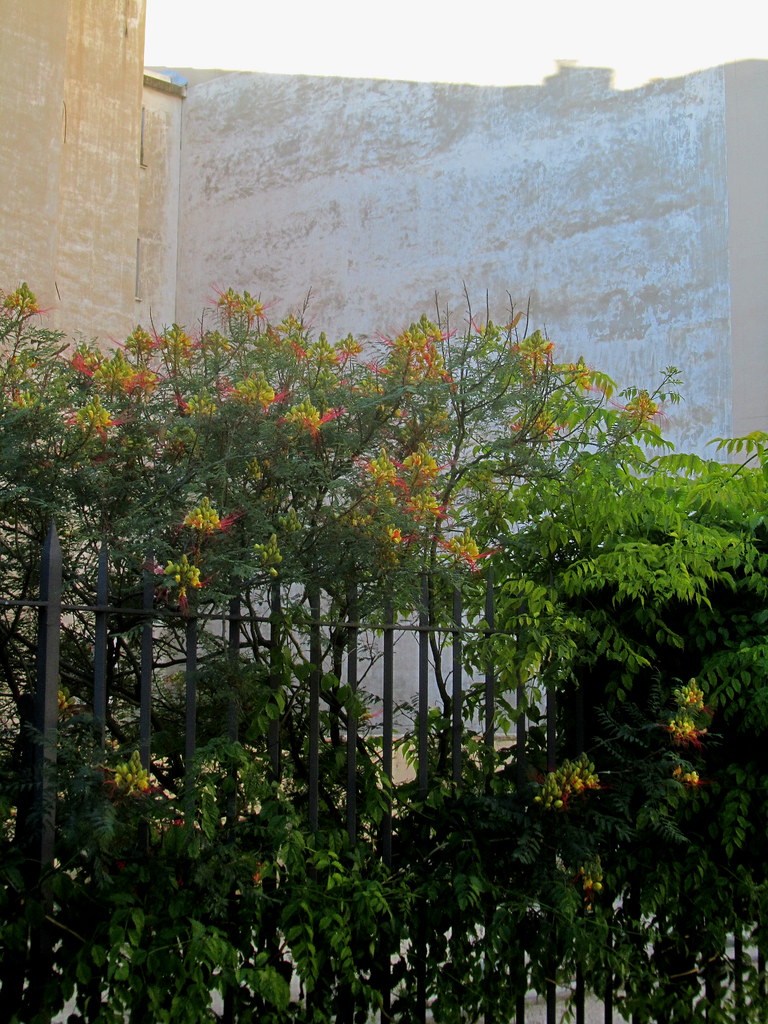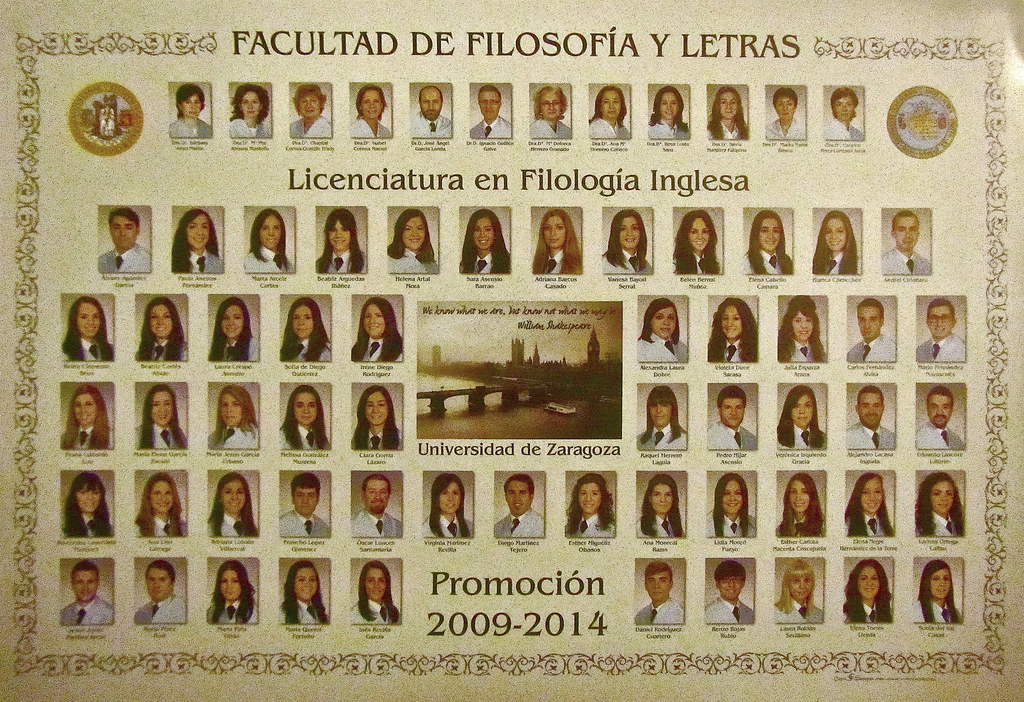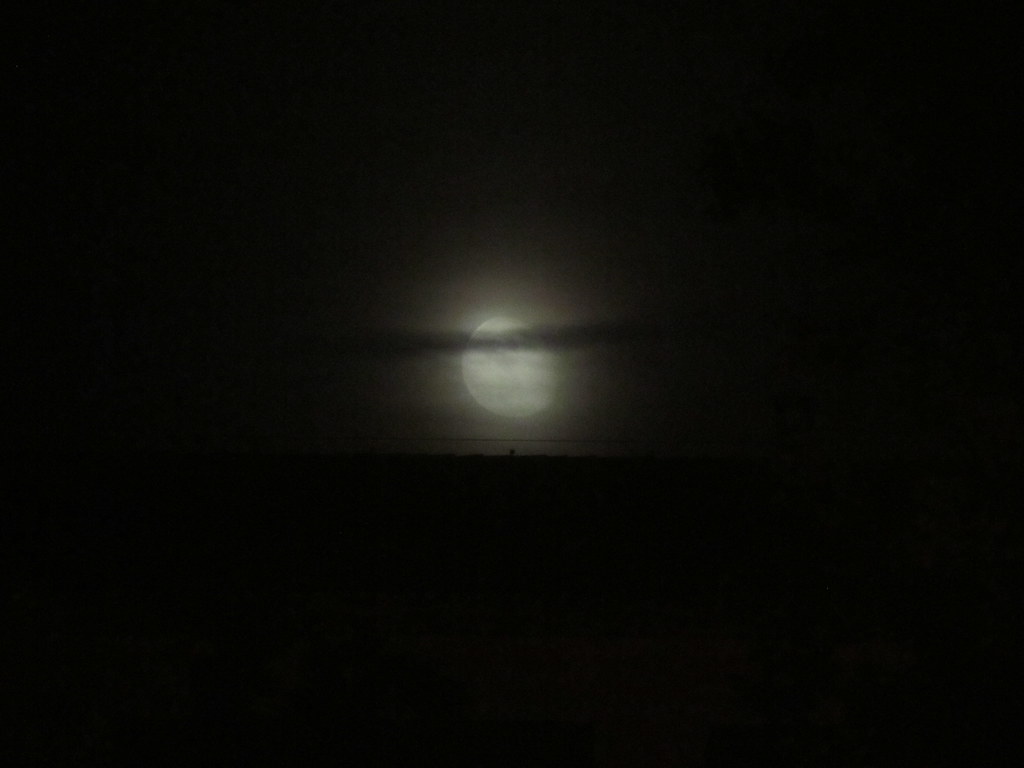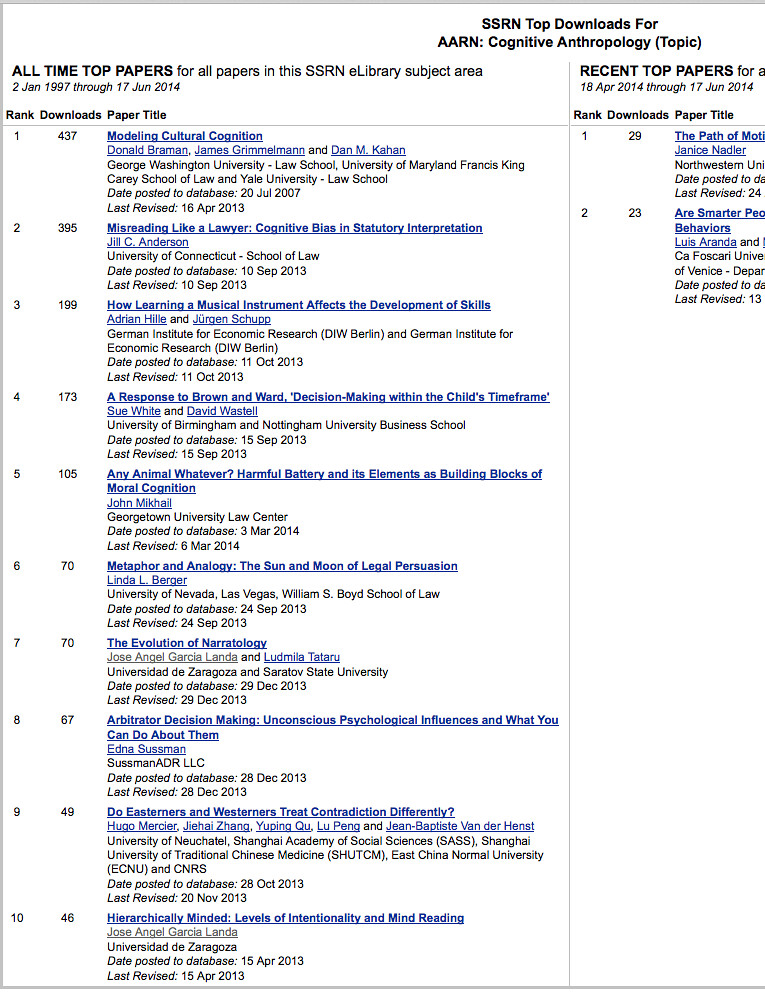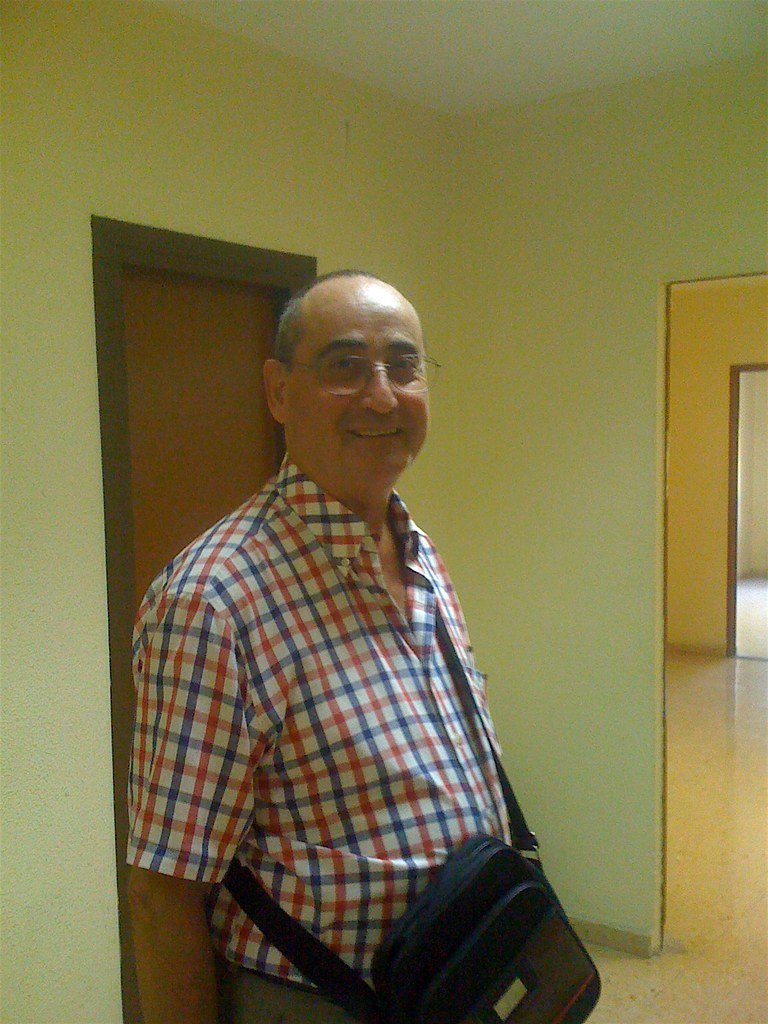lunes, 30 de junio de 2014
Diga TREINTA Y TRES
Termino este curso académico escalando todavía posiciones en el repositorio más importante de mi área —y del mundo según se mire, el SOCIAL SCIENCE RESEARCH NETWORK. Según este ránking, ordenado por número de artículos allí subidos, ocupo el puesto 33 de entre la lista de los 30.000 primeros autores (los 30.000 más leídos de entre los casi 300.000 que allí figuran). En el ránking por visitas, hay que admitirlo, soy menos visitado, aunque también estoy entre los primeros miles en número de consultas.
En Vene, ecia. Vene, ecia.

También he visitado medio Véneto, desde Fossalta di Piave a las ruinas de la mansión de Iliana Ivancich, donde nos dieron una degustación de su vino local a mi manera. Y hemos cruzado San Marco inundada, andando como Cristo sobre las aguas, y hemos comprado máscaras venecianas, de Arlequín y de Médico de la Peste.
Ayer tocó la vuelta, saliendo en vaporetto de San Servolo, y pasando por el aeropuerto Marco Polo a pie de góndola. Y luego también hemos estado entre las nubes y turbulencias, fuera de nuestro lugar natural. Y en aeropuertos franceses como cárceri de Piranesi; demasiados aviones hemos cogido, eso sí, con el firme propósito de no volver a cogerlos y no pasearnos más entre las nubes.
Y también hemos echado una siesta en Arudy, hemos pasado por Louvie-Juzon en una tarde de ensueño, con el valle de Ossau vacío para nosotros, hemos visto parte del mundial en Laruns, de domingo por la tarde... y hemos visto el balneario abandonado de Les Eaux-Chaudes, y la frontera con una luz espectacular. Después de cenar en Biescas con mamá y recoger a los niños, culminamos el viaje con éxito en la clínica, de urgencias, y buscando farmacia por la calle Arzobispo Morcillo. Tienen una historia, esa calle y ese arzobispo, pero por hoy lo dejo, que hay que acostarse a las tres, agotados. Si entrase en detalles.... pero hay más cosas en un día de las que caben en un mundo, ya lo dijo James Joyce, y Borges también, en su soneto a Joyce:
del tiempo, desde aquel inconcebible
día inicial del tiempo, en que un terrible
Dios prefijó los días y agonías
hasta aquel otro en que el ubicuo río
del tiempo terrenal torne a su fuente,
que es lo Eterno, y se apague en el presente,
el futuro, el ayer, lo que ahora es mío.
entre el alba y la noche está la historia
universal. Desde la noche veo
a mis pies los caminos del hebreo,
Cartago aniquilada, Infierno y Gloria.
Dame, Señor, coraje y alegría
para escalar la cumbre de este día.
viernes, 27 de junio de 2014
The woman and the Lesbian
A self-explanatory explanation from Berger & Luckmann's The Social Construction of Reality:
"The relevance structure that is shared by the man and the woman (A-B) does not have to be integrated with the one shared by the woman and the Lesbian (B-C) or with the one shared by the Lesbian and the man (C-A)."
—oOo—
domingo, 22 de junio de 2014
Will the Player
As for the extraordinary ones, the movers and shakers, history for me was a rogues' gallery. The angel of history is the angel of death. Idealists sooon become tyrants and cheats, as power corrupts. Listen to them whine and bark. Their convictions divide the world and only an honest doubt can unite it again. But their minds are closed and moulded, they have none — no honest doubt — and that's what makes them dangerous. Certainty is lethal. Conviction kills. That's my credo. All I know is that I know nothing, and that truth is like January, Janus-faced, looking to a lost year and one to come. My father wore a Protestat face and my mother kept on her own face at home while her husband made his a vizor to his heart, so they were split, as man and wife often are, and he was fractured too, public and private, outward and real. And that split is the best keys to the plays his son came to write. I saw that it was possible to be two people at once, to lead a double life, and out of this came Hamlet, Iago, Hal, and many others, good and bad, including me, who mocked authority, aristocrats, land-grabbers, players, but strove for substance, standing, armorial bearings and theatrical assets, while regretting every inch that staged me to the public view and turned my art to profit.
And so the exterior me — discretion, moderation, and reserve. How careful was I when I took my way, each trifle under truest bars to trust. I hid my beliefs in history, buried my voice in time and place, like the Bay of Portugal had an unknown bottom. I was ever unquarrelsome — even abject, some would say, still begging each treacherous friend to spare me some crumb of love. Not one whose help you could clearly count on, because much of the time the man you thought you saw was never there. A playmaker who avoided the first person and in so doing became no person. A man who in writing about other men reprieved himself from the man he was. A man wanting a litle self-confidence perhaps, except in plays. And outside the making of plays, a man even wanting in imagination, a compulsive acquirer, a land man, an Osric, burying his personal flaws in property, the safe palpabilities of earth and income, bricks and mortar, stocks and stones. A reversion, if you like, and a regression, back to the sucking dung that had clung to me and from which I'd longed to escape. The simple life. Yes, I could always smell the countryside through the squalor and the stench of London and the suffocating falsities of the court.
Yet, I longed for play, like any actor, and I longed for land, like any peasant. I loved beauty, especially woman's, and I paid for the pleasure, loved children and birds and plants for their simplicity and innocence, and all who kept boredom at bay and conquered the empire of dullness. Life itself I found far more interesting than anyone's opinions about it. I loved the surface of the earth and the whole process of human existence, which never ceased to fascinate me. I was enchanted by the maltworms and by the tapsters who served them. The human story was meat and drink to me. Osmotic, omnivorous, endlessly curious, that was me, that was your Will.
(...)
Of what manner of man is he, then, your Will? Why, of mankind. If your really want an image of myself as I was, look in the mirror and there you'll seem me, rather sadder and wiser than I'd have elected to be at my age, or you at yours. One of yourselves, that's all, one of the race of human beings, good enough for neither animals in their innocence nor gods in their wisdom. I was marked out not in appearance but in fortune—which buckled a talent on my back, a talent for words. I died in words and rose again like the phoenix, transformed.
—oOo—
La situation politique
- Ma foi, pas grand chose de bon. Á mon avis, la crise ministerielle est inévitable.
- Peut-être que vous avez raison.
Enciclopedia y metodología de las disciplinas filológicas
Encyklopädie und Methodologie der philologischen Wissenschaften. Ed. Ernst Bratuscheck. Leipzig: B.G. Teubner, 1877.
En red en Open Library:
http://www.archive.org/stream/encyklopdieund00bcuoft#page/n3/mode/2up
Otra edición temprana:
August Böck, Encyklopädie und Methodologie der philologischen Wissenschaften. Ed. Ernest Bratuscheck. 2ª ed., rev. Rudolf Klussmann. Leipzig: Teubner, 1886.
Ficha en Open Library.
sábado, 21 de junio de 2014
On Myself
O bien, "José Angel García Landa on José Angel García Landa".
Bueno, no sólo me on myself, sino también reseñas de otros, crítica, bibliografía y recursos varios—sobre mi Humilde persona. Información de sobra para toda esa gente que la anda buscando y no sabe cómo dar con ella.
Podemos encontrarla en esta página de Google Docs que acabo de actualizar.
Foto nº 25.000
¿Qué sentido tiene seguir haciendo fotos y colgándolas en este fotoblog? Lo que precede es una pregunta retórica, y lo que le sigue es una constatación.
Otra constatación es que no conozco ningún fotoblog con más fotos que el mío— si Vds. conocen alguno, sírvanse comunicármelo.
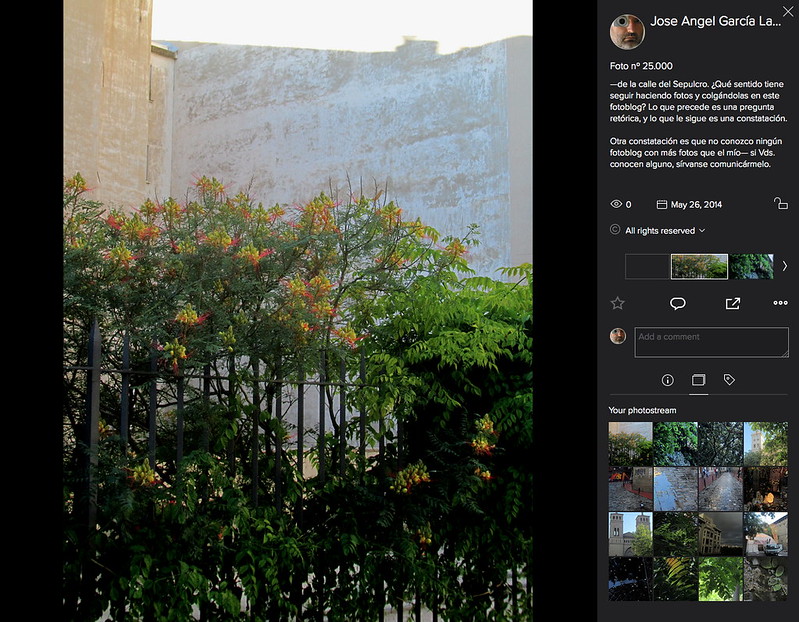
—oOo—
viernes, 20 de junio de 2014
No es modestia
No lo digo por tocar las narices, pero en el artículo "Philologie" de la Wikipedia alemana estamos unos cuantos clásicos, y yo. No es modestia, es constatación: allí veo a Schlegel, Boeck, Nietzsche, Szondi, McGann... y a algún otro nombre menos conocido, entre ellos el mío. No es que sea ingresar en la Academia, pero menos da una piedra.
A cuenta, por cierto, de una Bibliografía cada vez más completa y cada vez menos visitada.

—oOo—
La última promoción
jueves, 19 de junio de 2014
Gilgamesh y la escritura
Este artículo interpreta el antiguo poema épico mesopotámico de Gilgamesh, la narración literaria más antigua del mundo. La temática de la búsqueda de la inmortalidad en el poema se examina en su relación con los elementos del mismo relativos a la escritura, y a la permanencia de los edificios (hechos de los mismos materiales que los antiguos textos sumerios). 'Gilgamesh' es, en cierto modo, la épica de la escritura, transcendiendo a la muerte y celebrándose a sí misma. Enfatizamos por tanto una dimensión reflexiva del poema.
__________
English abstract: GILGAMESH AND WRITING
This paper is a reading of the ancient Mesopotamian epic of Gilgamesh,
the most ancient narrative in the world. The poem's subject of the
search for immortality is examined in its relationship to the elements
related to writing, and to the permanence of buildings (made of the same
materials as ancient Sumerian texts). Gilgamesh is, in a way, the epic
of writing transcending death and celebrating itself. A reflexive
dimension in the poem is thereby stressed. The paper is written in
Spanish.
Gilgamesh y la Escritura (Gilgamesh and Writing)
Date posted: June 17, 2013
https://papers.ssrn.com/abstract=2280022
| eJournal Classifications | Message |
AARN Subject Matter eJournals Linguistic Anthropology eJournal - CMBO  AARN: Language, Culture & Power (Topic) - CMBO  AARN: Identity & Belonging (Sub-Topic) - CMBO
|
Added to eLibrary

|
AARN Subject Matter eJournals Linguistic Anthropology eJournal - CMBO  AARN: Language, Culture & Power (Topic) - CMBO
|
Added to eLibrary

|
AARN Subject Matter eJournals
|
Added to eLibrary

|
PRN Subject Matter eJournals
|
Added to eLibrary

|
PRN Subject Matter eJournals Aesthetics & Philosophy of Art eJournal - CMBO  PRN: Philosophy of Art (Topic) - CMBO
|
Added to eLibrary
 |
También aquí:
_____. "Gilgamesh y la escritura." In García Landa, Aggelos: Mi enviado—Blog de notas de José Ángel García Landa (septiembre-diciembre de 2005) 12 Dec. 2005.* (Battelle, eternity).
http://www.unizar.es/departamentos/filologia_inglesa/garciala/z05-3.html
2012 DISCONTINUED 2018 Online at the Internet Archive.*
2020
https://www.flickr.com/photos/garciala/39910765843/in/dateposted-public/
2020
_____. "Gilgamesh y la escritura." In García Landa, Vanity Fea 12 Dec. 2005.*
https://garciala.blogia.com/2005/121201-gilgamesh-y-la-escritura.php
2025
_____. "Retropost, 2005: Gilgamesh y la escritura." In García Landa, Vanity Fea 12 Dec. 2005.* (Battelle, eternity).
https://blogdenotasvanityfea.blogspot.com/2025/12/gilgamesh-y-la-escritura.html
2025
https://x.com/JoseAngelGLanda/status/1999355333211254896
2025
_____. "Gilgamesh y la escritura (II)." In García Landa, Vanity Fea 12 Sept. 2006.
http://garciala.blogia.com/2006/091201-gilgamesh-y-la-escritura-ii-.php
2006
_____. "Gilgamesh y la escritura." Narrativas 9 (April-June 2008): 14-20.*
http://www.revistanarrativas.com/
https://skydrive.live.com/?cid=8daad0c208167bbc&id=8DAAD0C208167BBC%21122#
2008
_____. "Gilgamesh y la escritura." iPaper at ResearchGate 12 March 2012.*
http://www.researchgate.net/publication/28308332
2012
_____. "Gilgamesh y la escritura (Gilgamesh and Writing)." SSRN 17 June 2013.*
http://ssrn.com/abstract=2280022
2013
Linguistic Anthropology eJournal 17 June 2013.*
http://www.ssrn.com/link/Linguistic-Anthropology.html
2013
Aesthetics & Philosophy of Art eJournal 17 June 2013.*
http://www.ssrn.com/link/Aesthetics-Philosophy-Art.html
2013
_____. "Gilgamesh y la escritura." Academia 6 Aug. 2014.*
https://www.academia.edu/7889891/
2014
_____. "Gilgamesh y la escritura." Net Sight de José Angel García Landa 4 Jan. 2024.*
https://personal.unizar.es/garciala/publicaciones/gilgameshNARRATIVAS.pdf
2024
_____. "Gilgamesh y la escritura." In García Landa, Vanity Fea 19 June 2014.*
http://vanityfea.blogspot.com.es/2014/06/gilgamesh-y-la-escritura.html
2014
Is Philosophy Dead?
Kaufman, Daniel, and Massimo Pigliucci. "Is Philosophy Dead?" Diavlog from Bloggingheads TV. YouTube (Brad Younger) 14 June 2014.*
https://www.youtube.com/watch?v=VWy5wIJ6MHQ
2014
"Respetar los derechos de las comunidades autónomas"
¿"Respetar los derechos de las Comunidades Autónomas"? Será de las que los tengan.
Cuarenta años—¿qué digo cuarenta? Ochenta, cien, ciento ochenta años llevamos con estos "derechos adquiridos" y privilegios subidos a la chepa. Con razón dicen los catalanes "¿Y Nusaltras por qué no?" —Así que ahora se lo dan a ellos por debajo de la mesa.
En este país de borregos desiguales, que no de ciudadanos iguales, inauguramos el nuevo reinado con la promesa de seguir defendiendo los derechos de las comunidades autónomas. Pues hale, que nos den, que para eso los votamos, a los defensores de derechos y privilegios. Más memos podremos ser, pero habría que estudiar cómo.
Por mi parte, hace tiempo que hago boicot a productos vascos, navarros, y catalanes.Y a los partidos que defienden estas estafas.
—oOo—
Noche de Reyes
Ójala que este país tenga un día la madurez suficiente para librarse para siempre de la plaga de los reyes.
Que no la tiene, está claro, viendo a sus monárquicos, y a sus republicanos.
Y entretanto, ójala que los reyes que tengamos a partir de hoy sean mejores que los que hemos tenido hasta ahora.
—oOo—
miércoles, 18 de junio de 2014
Number Nine
A Javier le gustaba Shakespeare, y muchos años lo explicó. Me acordaba de él leyendo esta novela, Will, sobre los últimos días del actor, que está aquí recordando su vida, larga como la vida y breve como un sueño:
What dreams may come.
There was a story about an emperor who dreamed he was a butterfly, and when he told it to one of his sages, the wise man asked him, how do you know you're not a butterfly dreaming you're an emperor? Good answer, Will. How do you know you're not a butcher's boy dreaming you're a dramatist? Or were a dramatist. It feels like a dream now, though it was only yesterday. But that's what happens as you approach the end of your time. The life you had drifts past you and away from you as if you were a drowning man. You see it as a sea of trouble, flecked with bright heads lolling slowly in the wishless sleep, all those you knew and loved, gone from you now, irretrievably lost.
David Daiches, A Critical History of English Literature
—y aquí el volumen 2, The Restoration to the Present Day.
Llego aquí siguiendo la pista a mi lista sobre David Daiches en Scribd.
martes, 17 de junio de 2014
En el Top Ten, y en el Top Ten
Energy Future 2030 - Closing Keynote
—by Rajendra Pachauri, a Nobel laureate expert on these issues.
Dos trozos de memoria
Dos trozos de memoria—de un pedazo de memoria que escribí cuando me presenté a cátedras por primera y última vez, en 2003. En 2004 interpuse un contencioso administrativo al respecto—ya hace diez años y más de estas batallitas. En suma, no me dieron la cátedra porque a pesar de mi excelente expediente, alabado por el tribunal, decidieron suspendernos a todos en el primer ejercicio. Y a correr.
Con alegres actuaciones de éstas se manda a la mierda a un departamento, y acabamos teniendo el ambiente que tenemos, de encefalograma plano y dedicado a una mera administración de papeles e impresos. The scene is dead. Pero dicen que así es siempre la academia, o así la acabamos haciendo.
Amor, adulterio y sexo en el teatro
Theatralia, núm. 16
49,00 €
Vigo, Editorial Academia del Hispanismo, 2014, 358 pp.
ISBN 978-84-15175-89-6
Información de la
Editorial Academia del Hispanismo:
AMOR, ADULTERIO Y SEXO EN EL TEATRO
El sexo solo engaña, y solo se convierte efectivamente en una experiencia engañosa, cuando va acompañado del amor o del dinero. Cuando no es así, es decir, cuando vive emancipado de esta causa (la ilusión) y de aquella consecuencia (la prostitución), el sexo es lo que realmente es: pura razón práctica. La lógica del amor se disuelve en metáforas. La lógica del sexo se resuelve en la unión corporal y humana.
El XVI Congreso Internacional de Theatralia, celebrado en la Sociedad Cervantina de Madrid durante los días 22-25 de abril de este año, se ha dedicado al tema Amor, adulterio y sexo en el teatro. Apenas unas semanas después de su celebración nos complace presentar en este volumen de Theatralia, número 16, una selección de las ponencias presentadas.
Del mismo modo, resulta de gran satisfacción anunciar la inminente aparición de un nuevo volumen, compañero del presente, titulado El sexo del teatro: arte y posmodernidad en la escena europea e iberoamericana, y que constituye un libro complementario de este Amor, adulterio y sexo en el teatro, al recopilar temáticamente una serie de ponencias también presentadas en el mismo Congreso Internacional de Theatralia.
Se constata que la revista Theatralia sigue de este modo su andadura anual, al publicarse tanto en el formato tradicional de libro impreso como en el formato posmoderno de edición digital, gracias al apoyo de Editorial Academia del Hispanismo.
Actualmente trabajamos en la organización de XVII Congreso Internacional de Theatralia, que tendrá lugar en la sede de la Sociedad Cervantina, en Madrid, los días 22, 23 y 24 de abril de 2015. El tema será, en esta convocatoria, el siguiente: Los siete "pecados" capitales en el teatro (Avaricia, Envidia, Gula, Ira, Lujuria, Pereza y Soberbia). Esperamos sus aportaciones.
Quede patente, una vez más, nuestro agradecimiento a los autores, colaboradores y congresistas que han hecho posible la elaboración y publicación de este volumen, así como a los buenos amigos y colegas de la Sociedad Cervantina de Madrid.
Vox
lunes, 16 de junio de 2014
Murió Javier Sánchez
Esta foto que le hice el último día que lo vi en el trabajo, quizá el último día que fue por allí, porque venía a dar cuenta de algo de su jubilación.
"Se despide Javier Sánchez", la titulé....
Mucho se aisló Javier al final; pasó una temporada difícil, y creo que le había cogido algo de fobia a la profesión. Pero por mucho que se aislase no man is an island, y desde aquí se oye la campana que dobla por él, y por nosotros. Se había dedicado a la lexicografía, a la paremiología y a los estudios renacentistas—aquí está su página de Dialnet, con algunas publicaciones suyas y alguna mal atribuida. Había fundado Javier la Sociedad Española de Estudios Renacentistas Ingleses (SEDERI). Estaba, por cierto, algo desilusionado porque nunca tuvieron la atención de invitarlo, siquiera como presidente fundador, a dar una conferencia cuando dejó de organizar los congresos él. Pero qué más dará eso ya, eso y todo. A mí me tenía simpatía, no sé si se acordaría de que había sido profesor mío, allá por los ochenta. De fonética inglesa—y de inglés también, uno de los primeros profesores que me encontré al llegar a la facultad—que de todo le tocó enseñar. Le hice un trabajo de curso allá hace más de treinta años, éste, en el que comparaba el vocalismo del inglés con el del francés. En un colegio francés había estado interno Javier, cuando creyó que iba para seminarista, es uno de los episodios curiosos de su vida que fue un tanto a bandazos y cambios súbitos e inesperados.... Aunque muchos años estuvo de seguido en este departamento, era aquí de la vieja guardia, de los tiempos de Cándido, de los que son una institución— y muchos años de colegas estuvimos, al principio con poco trato, luego con algo más en los últimos años. Me regaló unos cuantos libros al irse, y he heredado además en cierto modo una de las asignaturas que él venía impartiendo últimamente, la de teatro inglés—"Our revels now are ended", and all that jazz. Luego me prejubilo yo también. Hemos propuesto que le dediquen un número de la revista del departamento—ceremonias inútiles y precarias de estas que hacen los vivos para los vivos, porque a los muertos no les podemos decir nada, siempre llegamos demasiado tarde. Algunas veces todavía más—a Javier ninguno lo tratamos demasiado bien, ni siquiera los que tenía más cerca y deberíamos haber estado más pendientes de él. Al final siempre te mueres solo, ni siquiera mal acompañado. Aunque buenos ratos también pasamos, también. Y hasta puede decirse que en realidad nos despedimos —de esas despedidas que, por suerte, no piensas que van a ser la última. Aún podría dejarse caer un día, quizá, a la hora del café—cosas habría que me sorprenderían más, así somos la gente.
________
Publicaciones que conozco de Javier Sánchez:
_______
RetroPS, 2014. Ahora tengo yo la edad de Javier Sánchez cuando murió. Hora de morir, quizás. Time to die.



